Скачать материал

Скачать материал




- Сейчас обучается 30 человек из 16 регионов


- Сейчас обучается 29 человек из 18 регионов
Описание презентации по отдельным слайдам:
-
1 слайд
WORD BUILDING (словообразование) (NOUNS- имя существительное) -er, — or To buy- buyer (покупатель) To direct- director ( директор) — (t)ion, (s)ion To collect – collection ( коллекция) To express- expression (выражение) — ment To agree – agreement ( соглашение) To pay – payment ( оплата) inspection improvement instructor production submission waiter recommendation settlement admiration management decision invention achievement selection
-
2 слайд
Check yourself Пловец- Акция Наслаждение- Писатель- Реклама- Строитель- Ассоциация- Учитель Аргумент- Отделение- Певец- writer advertisement singer association swimmer action enjoyment separation builder argument teacher
-
3 слайд
WORD BUILDING (словообразование) (NOUNS- имя существительное) — ure To please – pleasure (удовольствие) To press – pressure (давление, нажим) — ance, — ence To differ- difference (различие, разница) To assist – assistance (помощь, содействие) — ing To paint – painting (живопись, картина) To watch – watching (просмотр, наблюдение) swimming, , running, interference, skating, picture, nature skiing, spelling, , seeing, sitting, agriculture
-
4 слайд
Check yourself perfom play accord prefer read mix meet wash fly ing ance ing ence ing ing ing ure ing
-
5 слайд
NOUNS- имя существительное — dom Free- freedom (свобода) King- kingdom (королевство) — hood Child- childhood (детство) Brother- brotherhood (братство) — ness Dark- darkness (темнота) Kind- kindness (доброта) — ship Friend- friendship (дружба) Leader- leadership (руководство)
-
6 слайд
Translate Falsehood Firmness Membership Happiness Neighbourhood Scholarship Wilderness Wisdom Ownership Dampness Relationship соседство сырость ложь владение родство выдержка членство счастье глушь, пустыня мудрость стипендия
-
7 слайд
Некоторые другие суффиксы для образования существительных -ism — ist — ian — ant, ent — i(ty) — ency — man — y — lion Capitalism Capitalist Magician Accountant, agent Activity Tendency Sportsman Recovery Rebellion
-
8 слайд
WORD BUILDING (словообразование) (Adjective- имя прилагательное) -able To change- changeable To eat- eatable -ful Beauty- beautiful Care- careful -less Hope- hopeless Home- homeless -y Cloud- cloudy Dirt- dirty 1.Fashionable, remarkable, hospitable 2.Wonderful, cheerful, frightful, restful, helpful, peaceful, thankful, joyful, frightful, successful, truthful, forgetful, respectful. 3. Heartless, friendless, useless, lifeless, fruitless, speechless 4. Sunny, windy, rainy, sanitary
-
9 слайд
WORD BUILDING (словообразование) (Adjective- имя прилагательное) -ant, ent To differ – different To resist – resistant -ive To act- active To effect- effective — al Centre- central Form- formal — ous Danger- dangerous Glory- glorious Intelligent, pleasant, ancient . Respective, federative, comparative, representative, massive. Architectural, political, mental, natural, chemical, medical, conditional, international, financial. marvelous, enormous, mountainous, imperious, pompous, generous.
-
10 слайд
Некоторые другие суффиксы для образования прилагательных — ic — an — ish — ed Heroic Russian Yellowish Armed
-
11 слайд
WORD BUILDING (словообразование) (Verb- глагол) -ate To decorate (украшать, декорировать) — en To frighten (пугать) — fy To unify (объединять) — ize (ise) To organize – (организовать)
-
12 слайд
Словообразование при помощи приставок (префиксов) un- — придает отрицательное значение или выражает противоположное действие (unhappy, unpack) in- — (перед l превращается в il-, перед m,p — im-, перед r- ir) (incorrect, impossible, irregular) re- — придает значение повторности или совершения действия вновь (reduce, recycle, reread) dis- — обозначает обратное действие, противоположное значению; отсутствие чего-либо, лишение качества ( disagreement, disadvantage, dislike, dislocate, disloyal) mis- — обозначает неправильность, противоположность значению основы (misunderstand, misadvise)
-
13 слайд
Некоторые другие префиксы Out- (outcome-исход, outcry-крик, протест, outline- очертание, outlook- вид снаружи) Over- (overweight- полнота, overcrowd-переполнять, overflow- переливать) Multi- (multiplication — умножение, multinational- международный ) Pre- (predominance — преобладать, prediction — предсказание)
-
14 слайд
Некоторые другие префиксы Sub- (subtropical- субтропический, subscription- подпись, subordinate- подчиненный) Non- (non-stop – без остановок, non-smoker- некурящий) Anti- (anti-freeze- незамерзающий, anti-fascist- антифашист, antipathy-антипатия) Counter- (countermand- отменять (приказ), counteract- противодействовать)
-
15 слайд
Check yourself Unfair- Dishonest- Informal- Illegal- Irresponsible- Incompetent- Inaccurate- Invisible- Unknown- Unambition Inexperienced- Uncertain- Dissatisfied- неумелый неудовлетворенный нечестный неизвестный несправедливый нелегальный неопределенный безответственный неформальный неточный невидимый бесцельный неопытный
-
16 слайд
WORD BUILDING (adverb-наречие) -ly (slowly, happily, excellently, clearly ) исключение Well — хорошо Better- лучше Best — лучше всех Badly- плохо Worse- хуже Worst – хуже всего Fast — быстро Внимание! Некоторые наречия после добавления суф. -ly имеют другой смысл: late (поздно)- lately (недавно) near(близко) — nearly (почти) hard (упорно) -hardly (едва)
-
17 слайд
WORD BUILDING (numeral — числительные) -teen six+teen=sixteen 16, но five+teen=fifteen 15 — ty sixty 60, но fifty=50 — th sixth 60-й, но fiftieth= 50-й ВНИМАНИЕ! 1st – first (первый) 2nd- second (второй) 3rd- third (третий) 5th – fifth (пятый) ninth- 9-й twelfth- 12-й twentieth- 20-й ninety-ninth – 99-й
-
18 слайд
Check yourself Twenty sixth Fourteenth Second Fifty seventh Ninety eighth Fortieth Thirtieth Thirty three Third Третий Тридцатый Второй Двадцать шестой Четырнадцатый Тридцать три Пятьдесят седьмой Сороковой Девяносто восьмой
-
19 слайд
Read and translate The President proposes, but Congress disposes. Experience is the name of everyone gives to his mistakes. Never work before breakfast, if you have to work before breakfast, get your breakfast first. A friend in need is a friend indeed. Reading is to the mind what exercise to the body. What is done cannot be undone. Better a glorious death than a shameful life. Punctuality is the politeness of kings.
-
20 слайд
Thank you for attention!
Краткое описание документа:
Презентация по английскому языку на тему WORD BUILDING создана для 7-11 классов. Тема актуальная , так как она присутствует в заданиях ЕГЭ. Презентация объемная и работа над ней у меня заняла большое количество времени. Учащиеся могут проверить свои знания в образовании новых частей речи, но и знания лексики. Презентация можно использовать при изучении английского языка с любым УМК по данной теме. На последнем слайде презентации вы можете прочитать некоторые поговорки и крылатые выражения, что расширит кругозор обучающихся.
Найдите материал к любому уроку, указав свой предмет (категорию), класс, учебник и тему:
6 210 103 материала в базе
- Выберите категорию:
-
Выберите учебник и тему
- Выберите класс:
-
Тип материала:
-
Все материалы
-
Статьи
-
Научные работы
-
Видеоуроки
-
Презентации
-
Конспекты
-
Тесты
-
Рабочие программы
-
Другие методич. материалы
-
Найти материалы
Другие материалы
- 06.12.2014
- 605
- 0
Рейтинг:
5 из 5
- 06.12.2014
- 7075
- 88
- 06.12.2014
- 745
- 0
- 06.12.2014
- 704
- 0
- 06.12.2014
- 1262
- 4
- 06.12.2014
- 3813
- 2
Рейтинг:
4 из 5
- 06.12.2014
- 9478
- 20
По теме: методические разработки, презентации и конспекты
How to Build Up Your Vocabulary
Данные материалы могут быть полезны учащимся старших классов и студентам языковых учебных заведений, которые хотят расширитьсвой запас слов….
Презентация «The Twelve Collegiums Building»
Презентация на тему «The Twelve Collegiums Building» создана как иллюстративный материал к практическому пособию для изучения достопримечательностей Санкт-Петербурга автора М.А. Гацкевич «Санкт-Петерб…
Презентация на тему «How to build words»
Данная презентация предназначена для введения грамматического материала на тему «How to build words». Может быть использована также на этапе отработки и закрепления грамматического материала….
-
Скачать презентацию (0.09 Мб)
-
19 загрузок -
0.0 оценка
Ваша оценка презентации
Оцените презентацию по шкале от 1 до 5 баллов
- 1
- 2
- 3
- 4
- 5
Комментарии
Добавить свой комментарий
Аннотация к презентации
Посмотреть и скачать бесплатно презентацию по теме «Word-building», состоящую из 13 слайдов. Размер файла 0.09 Мб. Каталог презентаций, школьных уроков, студентов, а также для детей и их родителей.
-
Формат
pptx (powerpoint)
-
Количество слайдов
13
-
Слова
-
Конспект
Отсутствует
Содержание
-
Слайд 1
Word-building
Conversion
Compounding
Afexes -
Слайд 2
Conversion
The formation of new words without changing their spelling and pronunciation.
From the verb
master – to master
house – to house
water – to water
From the adjective
empty – to empty
white – to white -
Слайд 3
Compounding
air + field = airfield
birth + place = birthplace -
Слайд 4
Afexes
Prefixes
Suffixes
syllables which we add before certain words to form new words. The meaning of the new word depends on the prefix that has been usedsyllables which we add to the end of the certain words to from new verbs
-
Слайд 5
Prefixes
The prefixes below are used to express opposite meanings.
de- (destabilise, dethrone)
dis- (disadvantage, disbelief)
in- (insufficient) ,il- (before l) illegal
im- (before b,m,p) immature, improbable
ir- (before r) irrelevant BUT unreal, unremarkable
non- (non-dairy),
un- (unattractive, uncivilized)
anti – (anticlockwise)
counter- (counterattack) -
Слайд 6
The prefixes with negative meaning
a- (amoral) ab- (absent)
mis- (misread) non- (nonexistent)The prefixes with meaning «too»
over- (to overpay) super- (superior)
ultra- (ultra-shot) out- (outlast) -
Слайд 7
uni- (one) uniform bi- (two) bilingual
co- (with) co-educational inter- (between) interstate
inter- (between) interstate multi- (many) multicultural
post- (after) postwar pre- (before) prenuptial
re- (again) redesign semi- (half) semi-circle
sub- under less- (subordinate)
trans- (travel) transatlantic
pro- (in favour of) pro-American
under- (not enough) underdeveloped
ex- (previous, former) ex-president -
Слайд 8
Suffixes
Nouns referring to people
verb+ -er/-or/-ar(work – worker, act- actor, burgle – burglar)
noun/verb/adjective+ -ist(social-socialist)
verb+ -ant/-ent(assist-assistant, reside – resident)
noun+ -an/-ian(republic – republican, Italy – Italian)
verb+ -ee (passive meaning) (employ – employee) -
Слайд 9
Nouns formed from verbs
–age post-postage
–al propose-proposal
–ance perform-performance
–ence coincide-coincidence
–ation animate-animation
–ion televise-television
–ment employ-employment
–sion pretend-pretension
–sishypothesise-hypothesis
–tion describe-description
–ure close-closure
–y discover-discovery -
Слайд 10
Nouns formed from adjectives
–ance relevant-relevance
–cy urgent-urgency
–ence patient-patience
–ion isolated-isolation
–iness happy-happiness
–ness sad-sadness
–ity relative-relatively
–ty royal-royalty
–y honest-honesty -
Слайд 11
Adjectives formed from nouns
–ous nausea-nauseous
–al nation-national
–ic history-historic
–ical theatre-theatrical
–ish girl-girlish
–ive suppression-suppressive
–ful (with) dread-dreadful
–less (without) name-nameless
–ant brilliance-brilliant
–able reason-reasonable
–y wealth-wealthy
–ly world-worldly -
Слайд 12
Adjectives formed from verbs
–able treat-treatable
–ible sense-sensible
–ive exclude-exclusive
–ate consider-considerate
–ent differ-deffererntVerbs formed from adjectives
–en bright-brighten
–ise real-realiseVerbs formed from nouns
–en strength-strengthen -
Слайд 13
literature – Virginia Evans, Jenny Dooley “Wishes”
Marina Bobrova. 1077/2
Посмотреть все слайды
Сообщить об ошибке
Похожие презентации









Спасибо, что оценили презентацию.
Мы будем благодарны если вы поможете сделать сайт лучше и оставите отзыв или предложение по улучшению.
Добавить отзыв о сайте
- Размер: 765 Кб
- Количество слайдов: 45
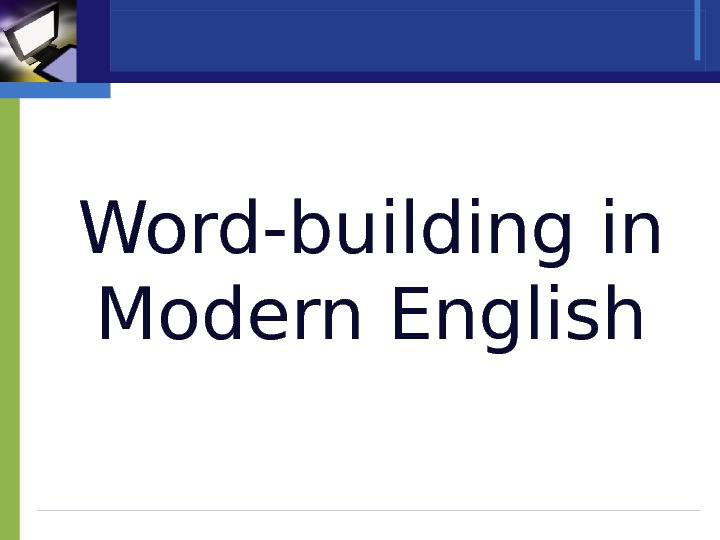
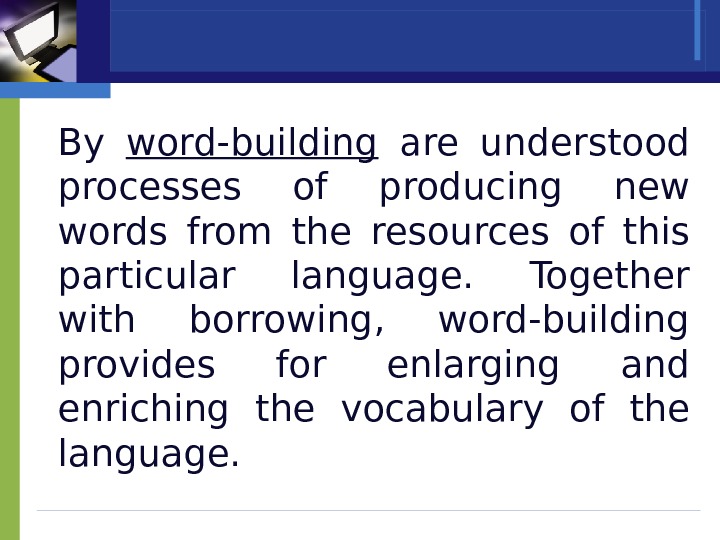
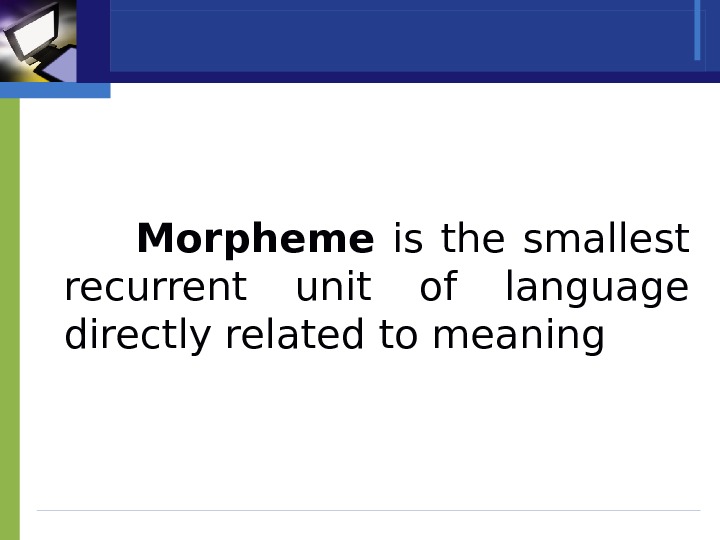
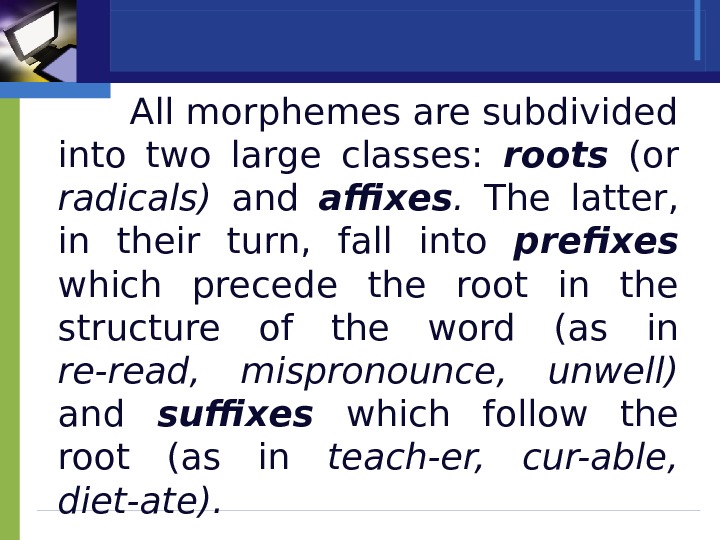
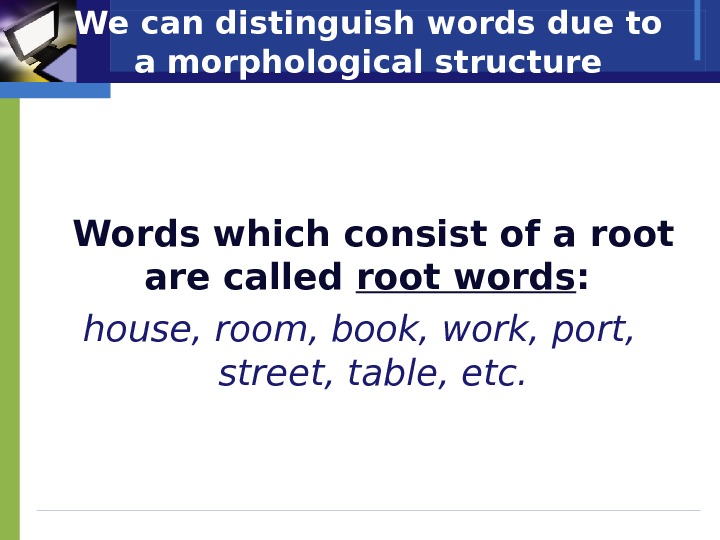

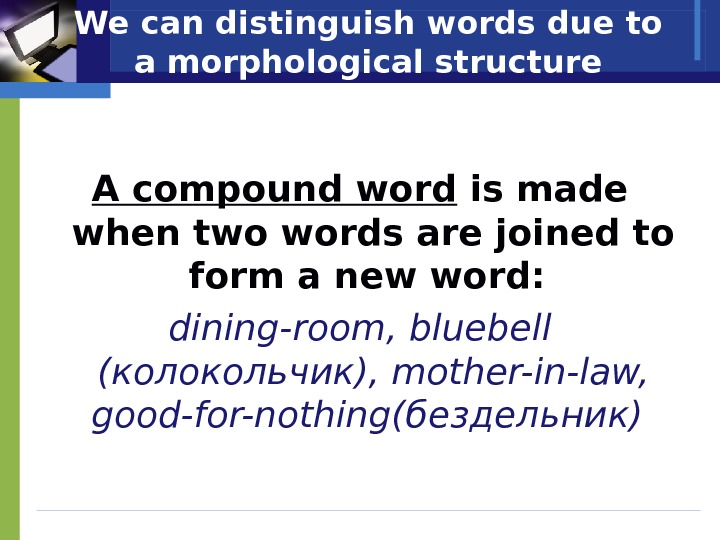
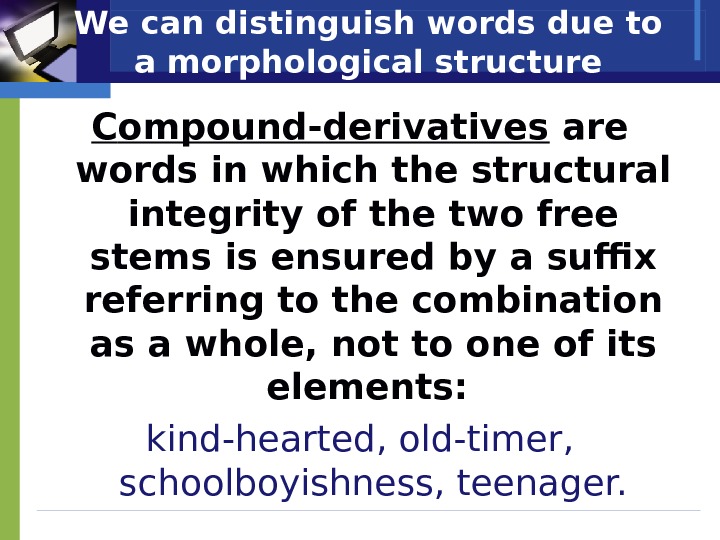
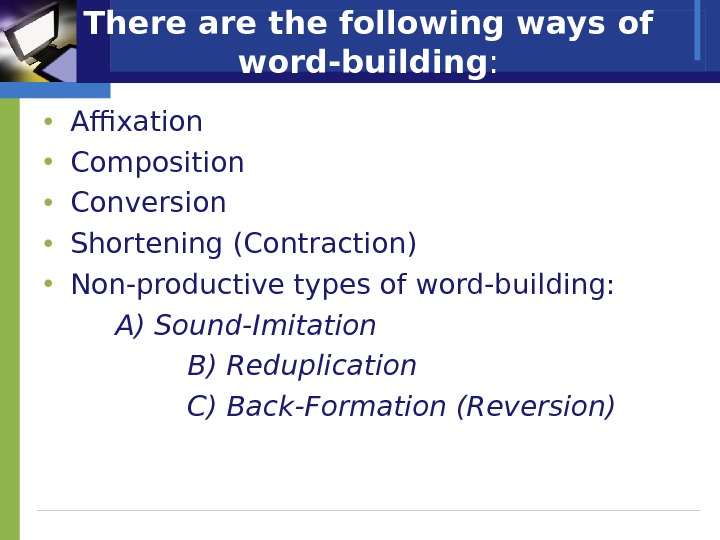
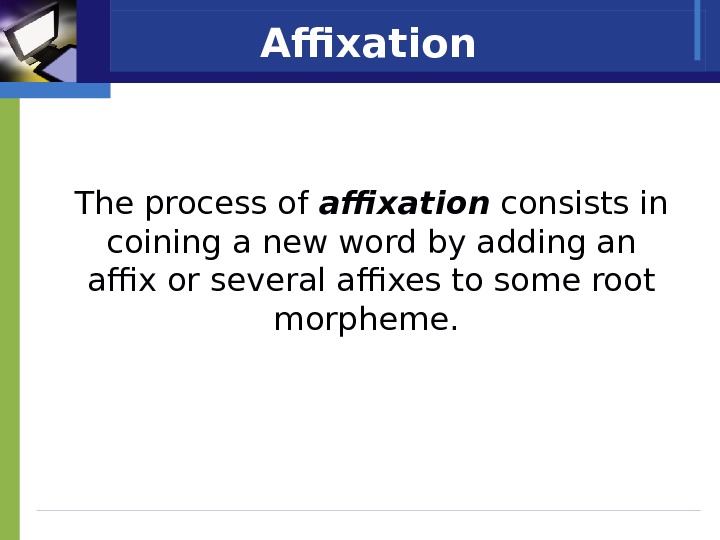
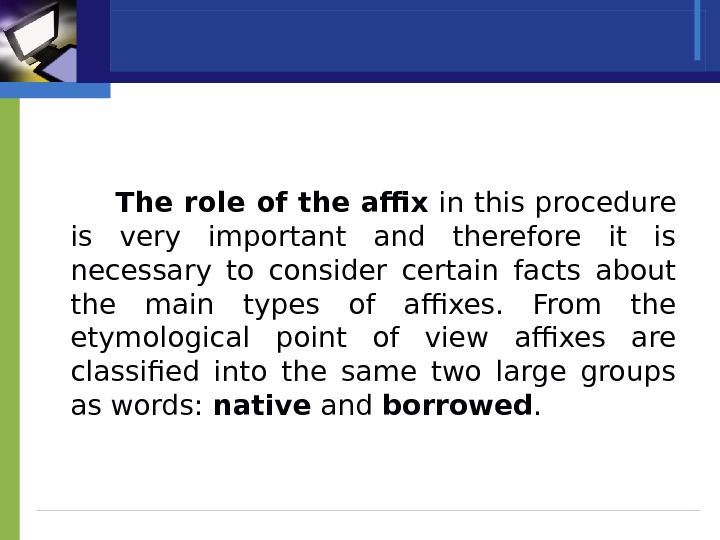
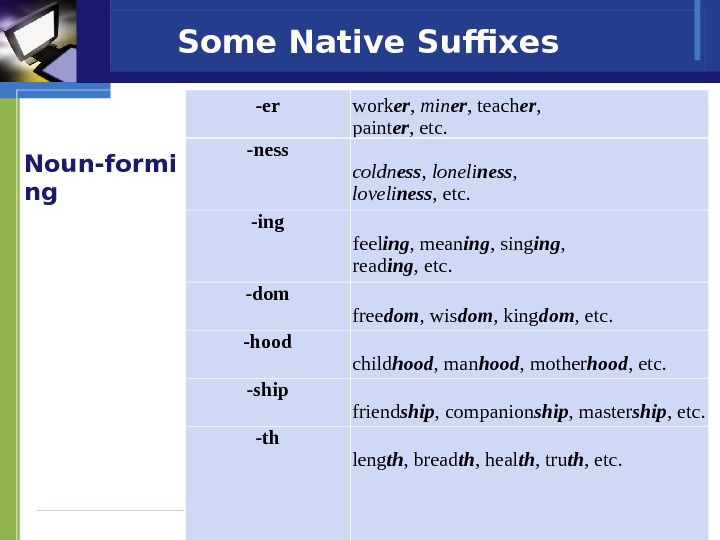
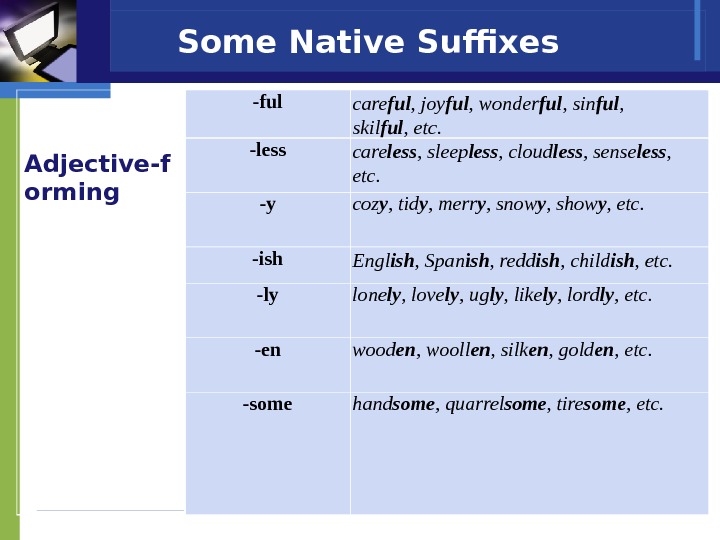
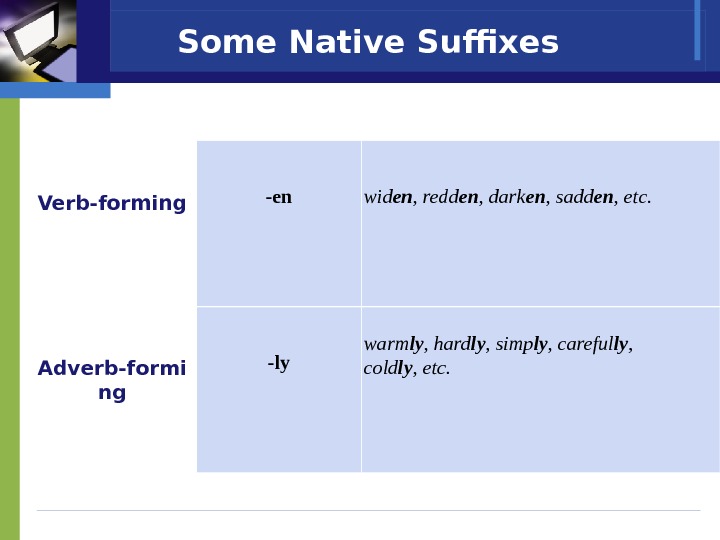
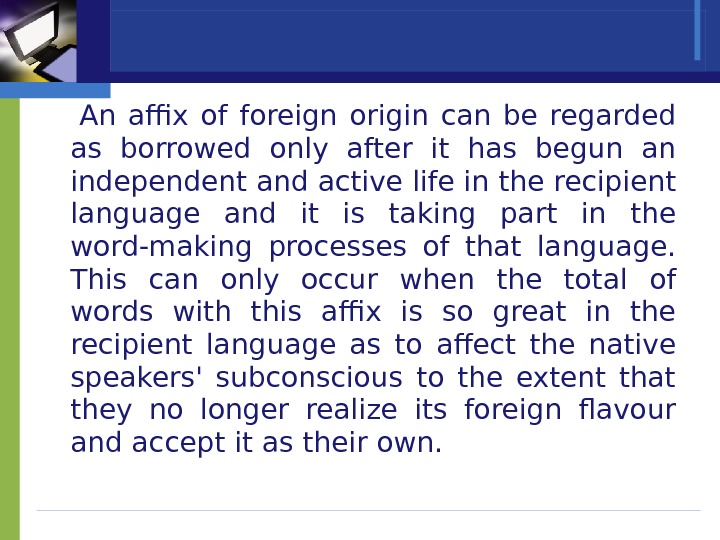
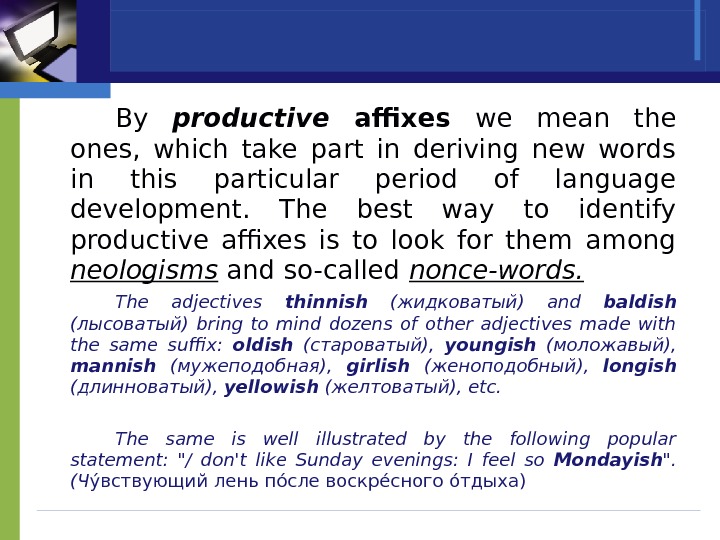
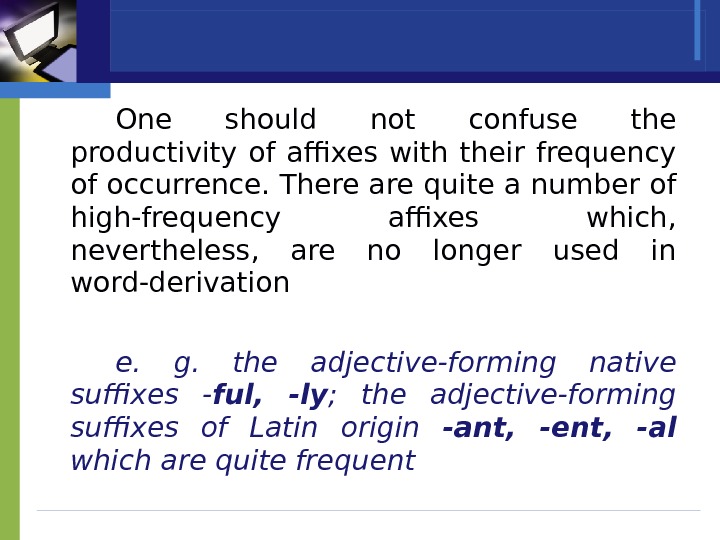
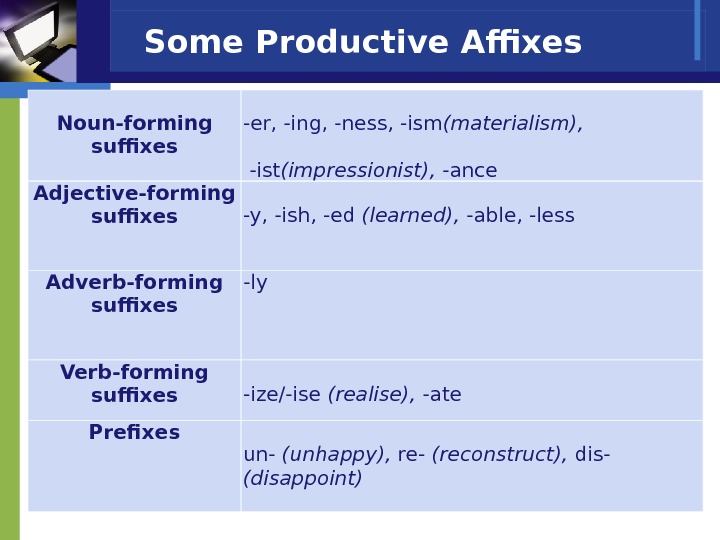
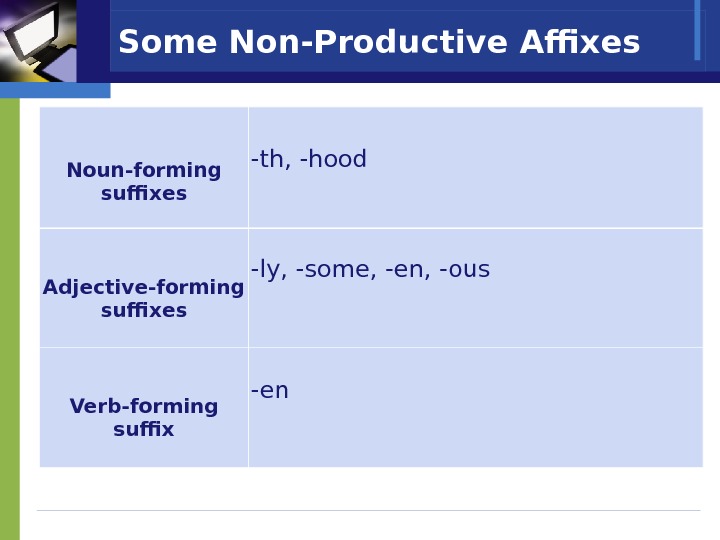
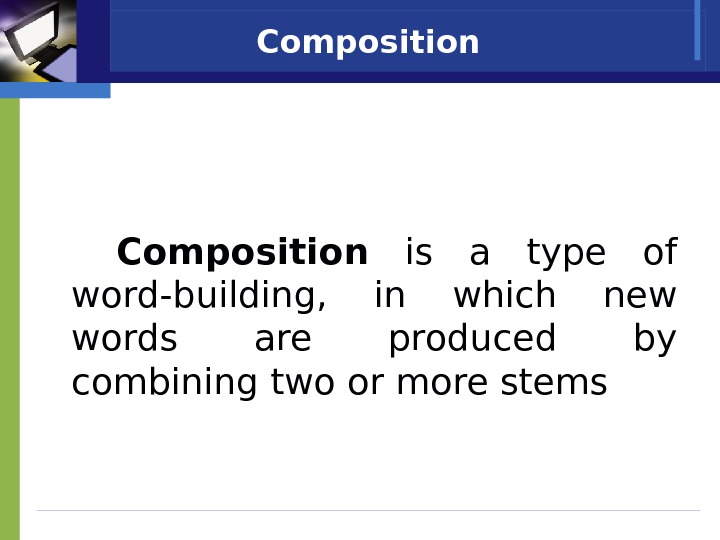
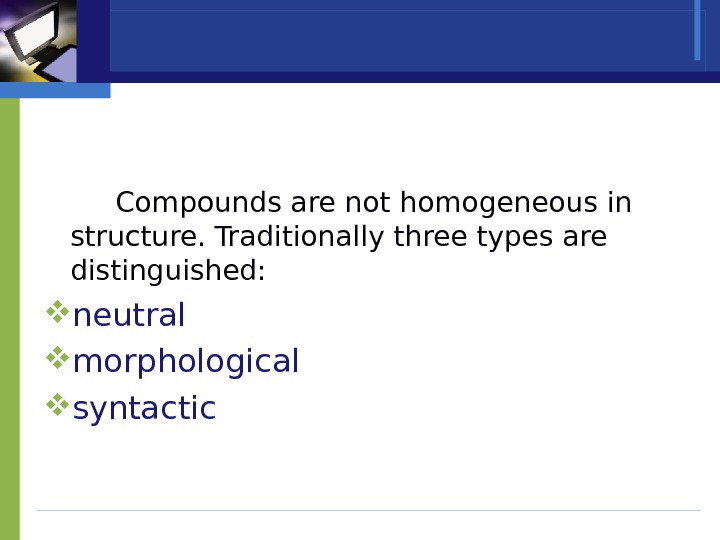
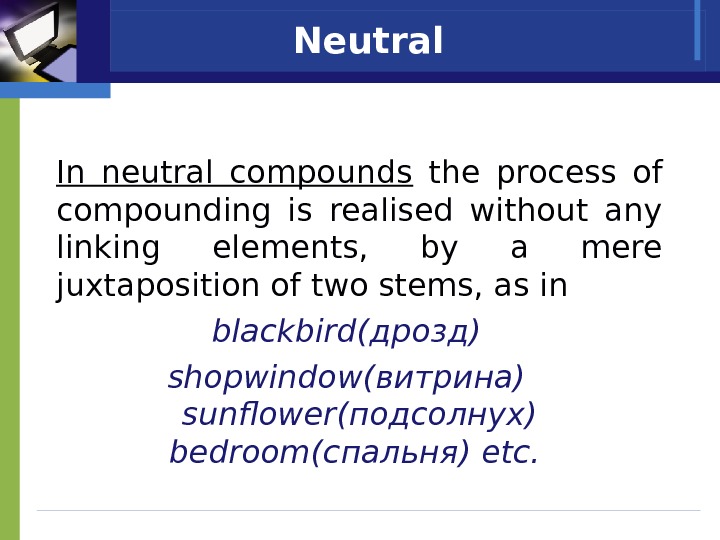
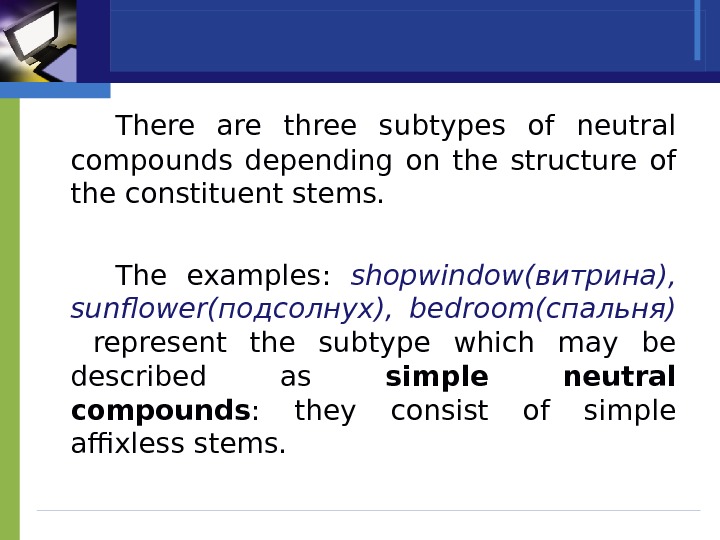
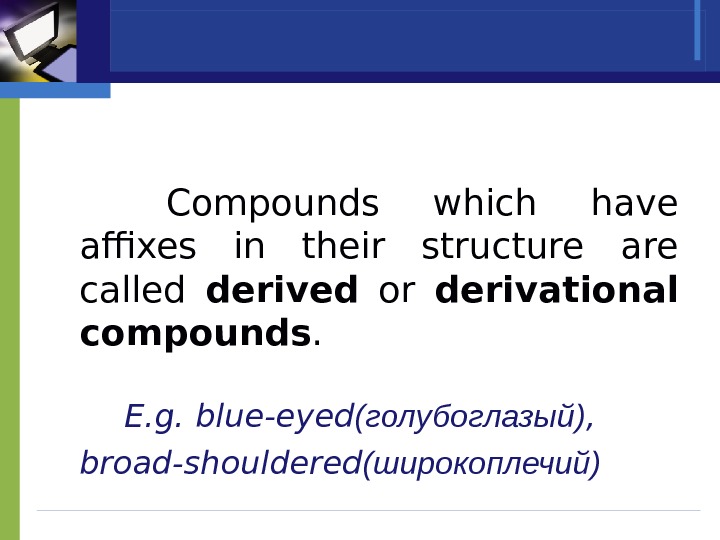
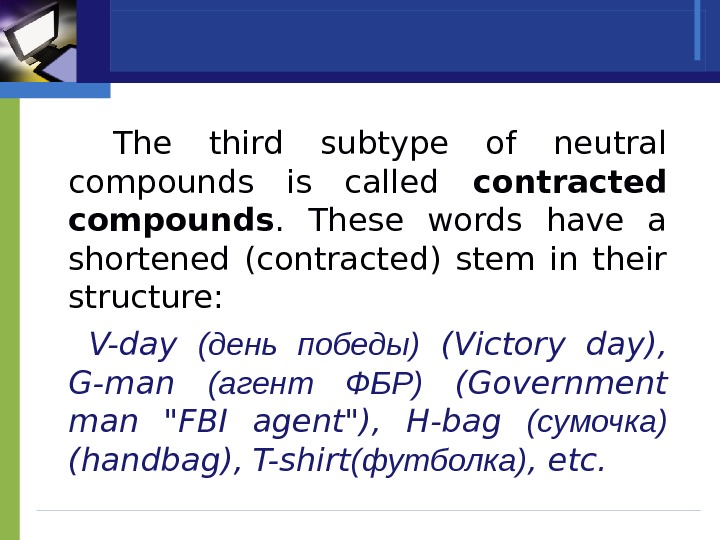

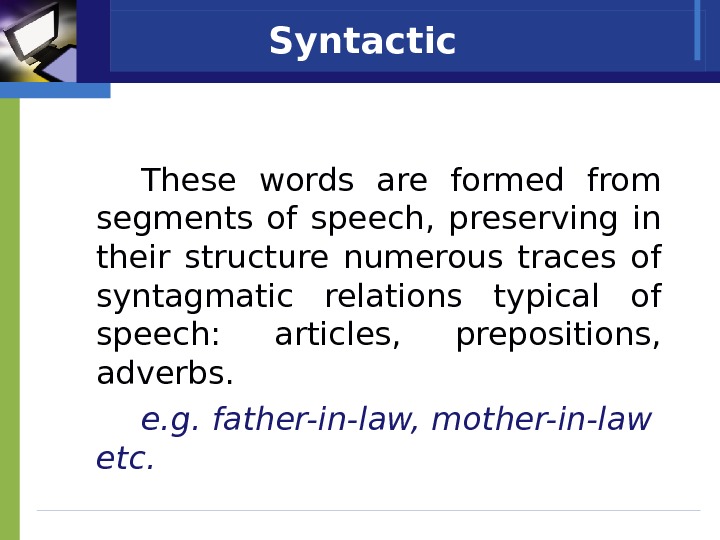
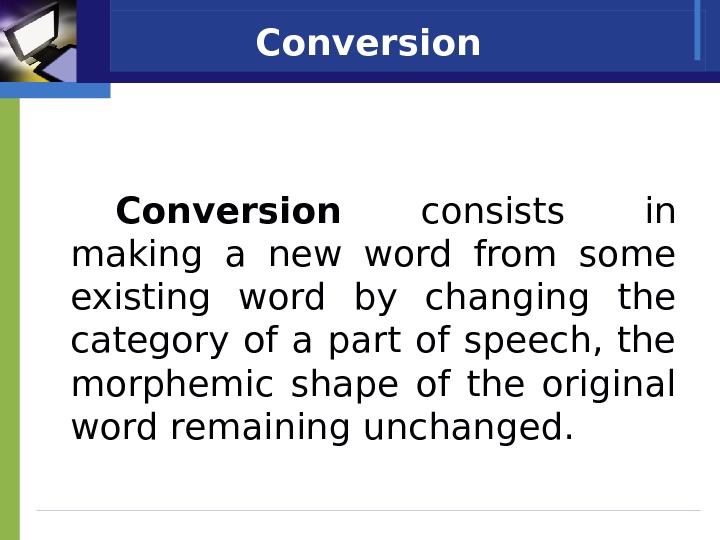
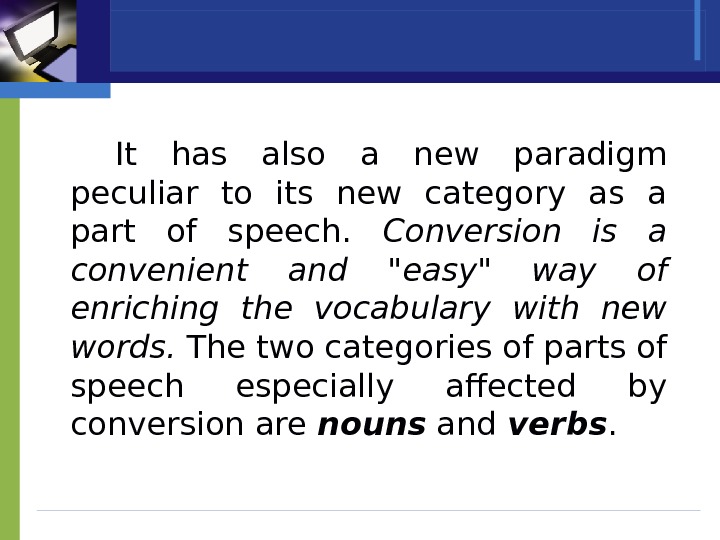
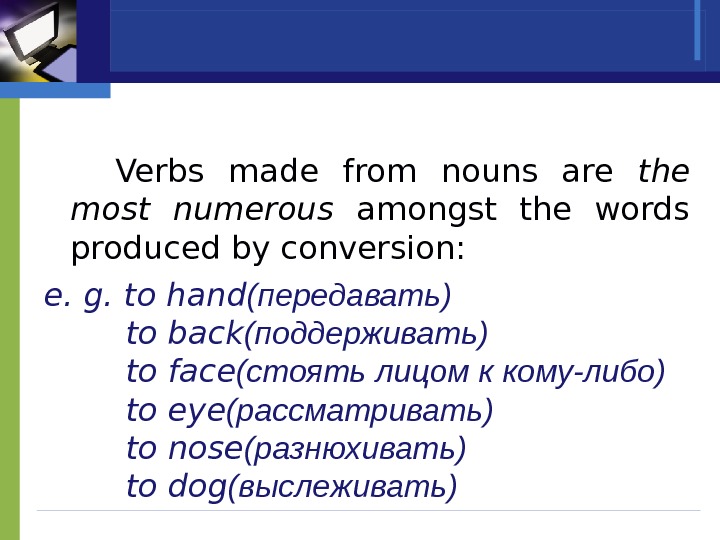
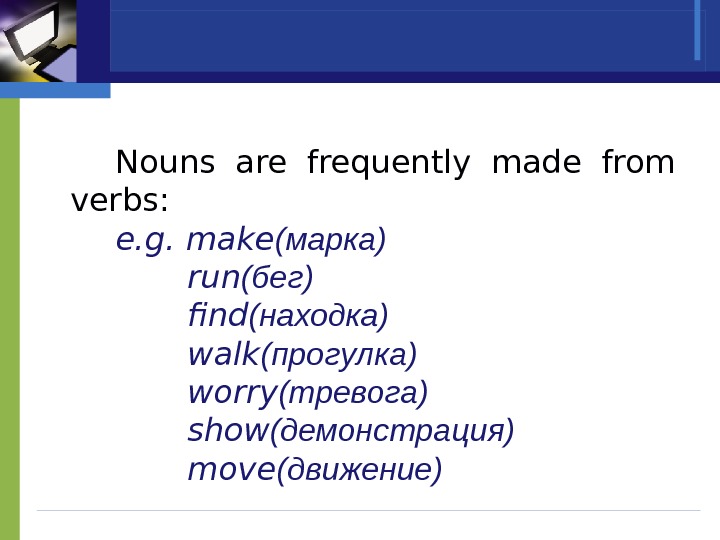
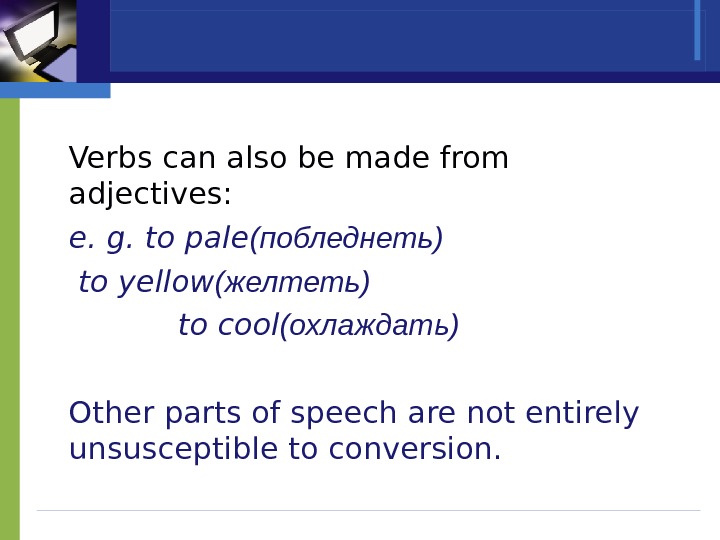
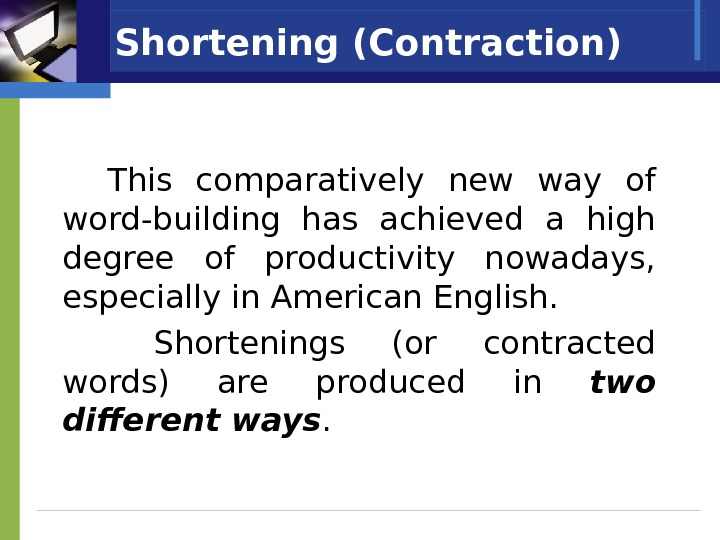
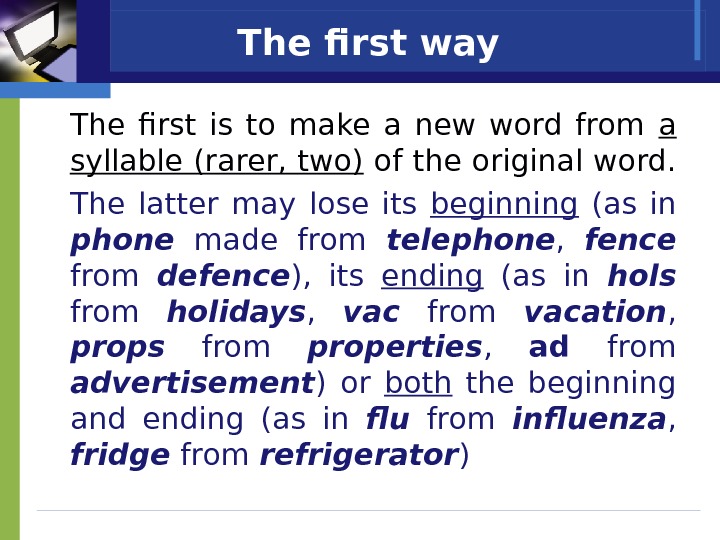
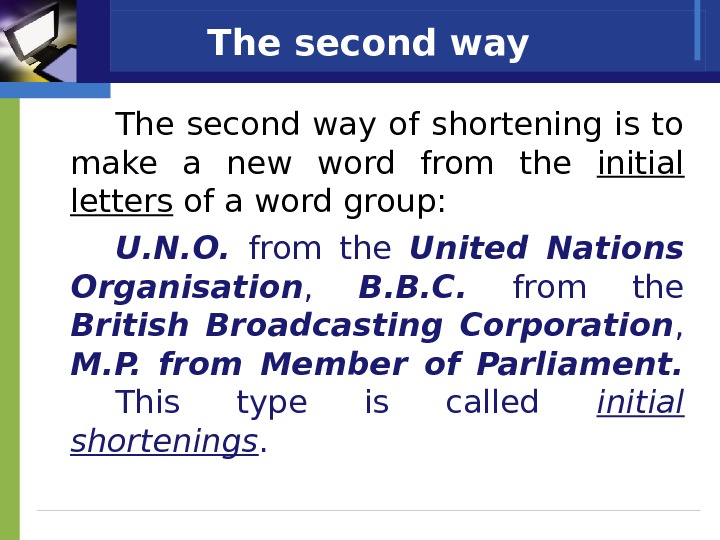
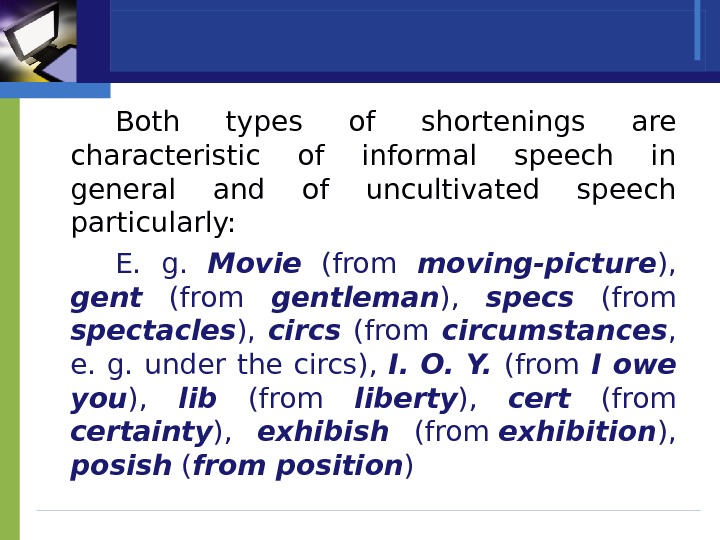
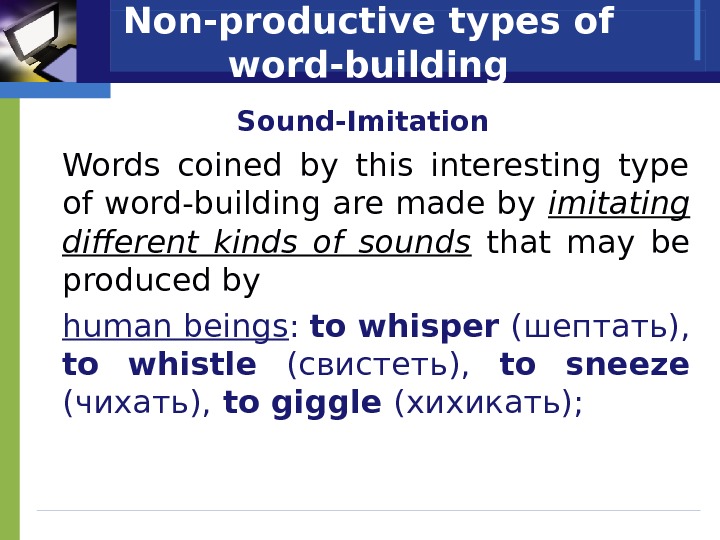
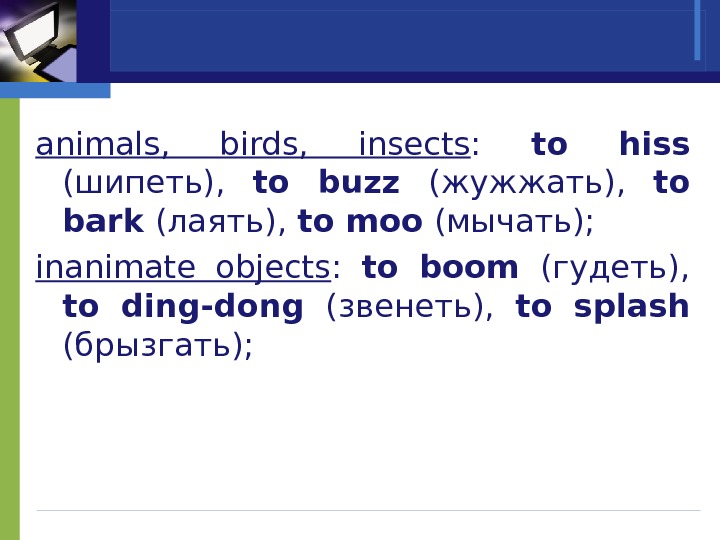
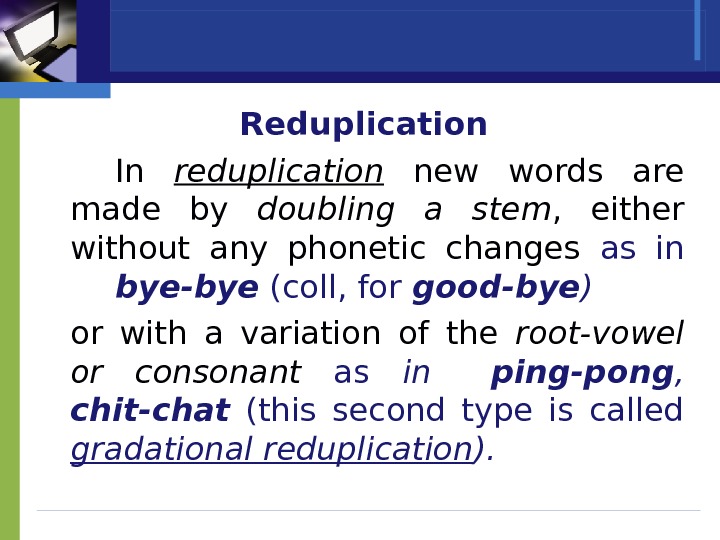
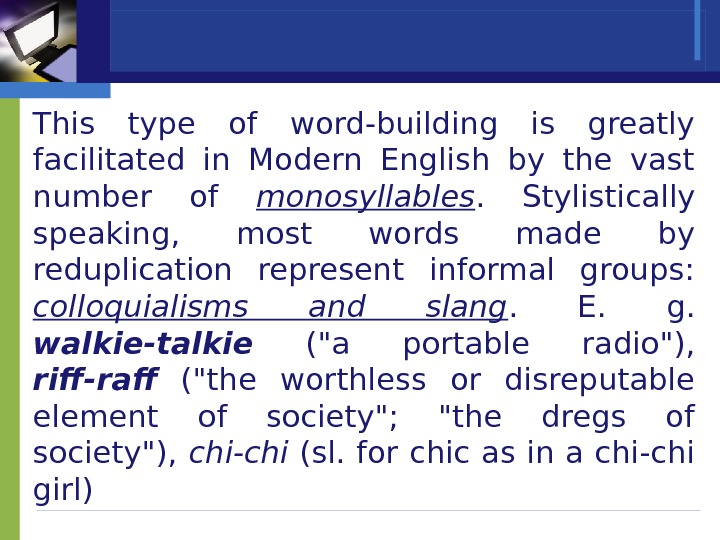
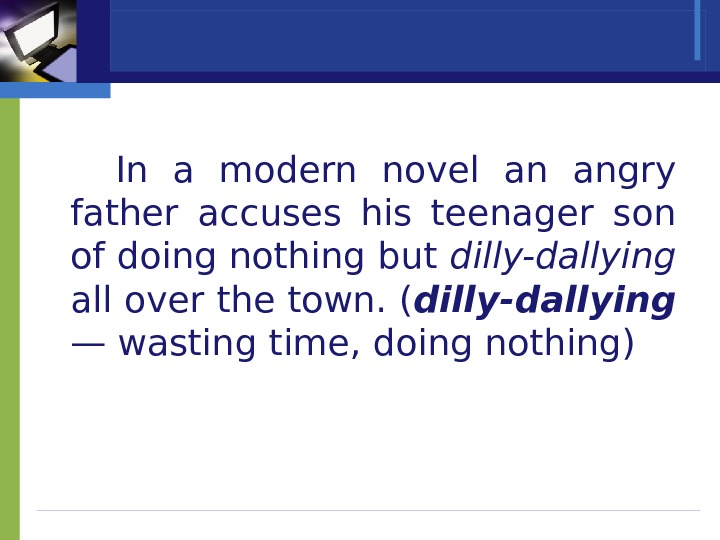
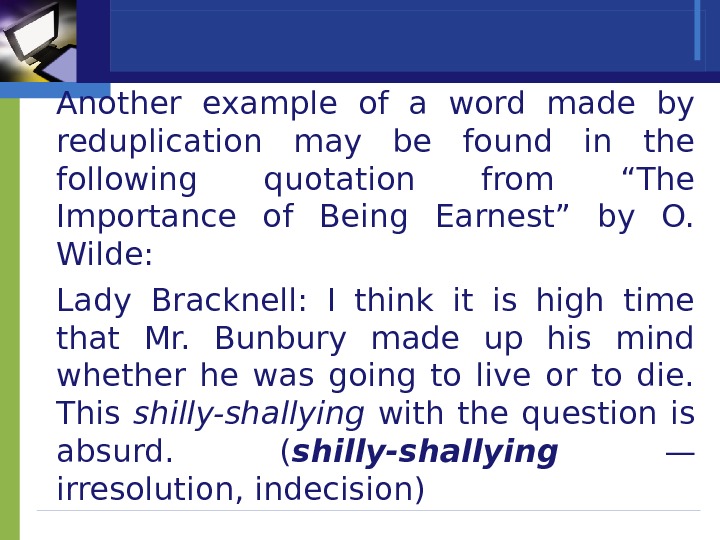
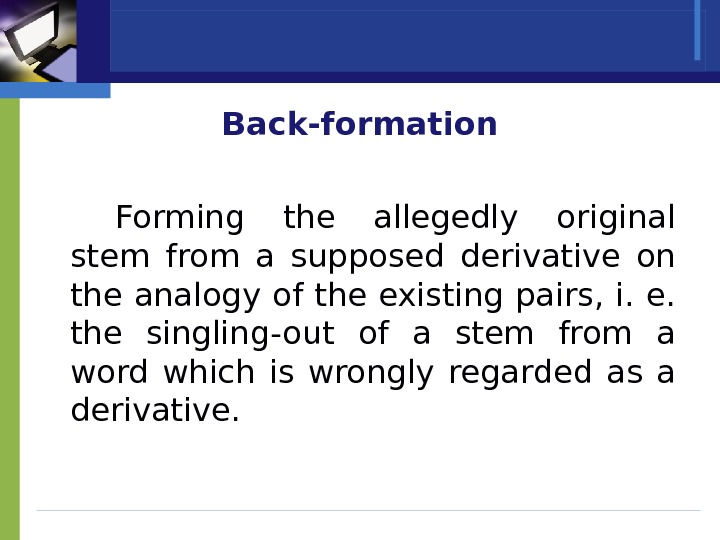
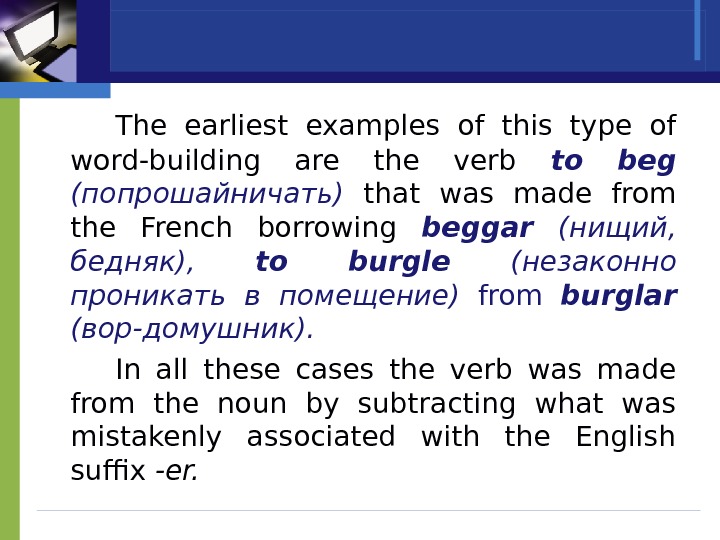
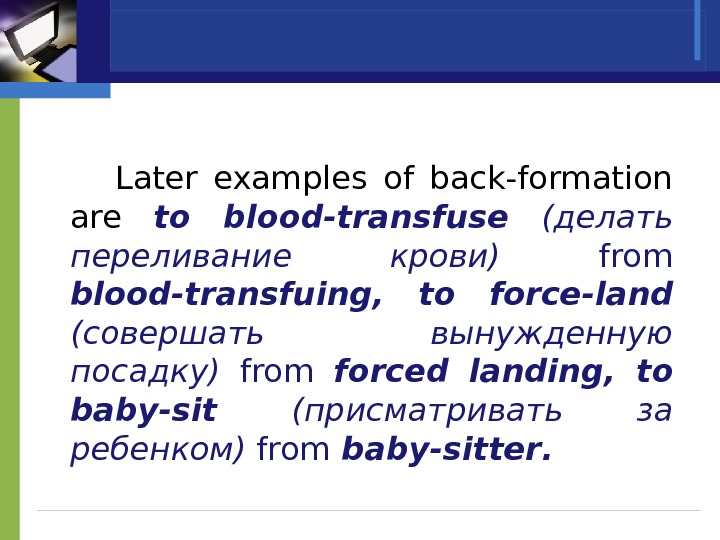




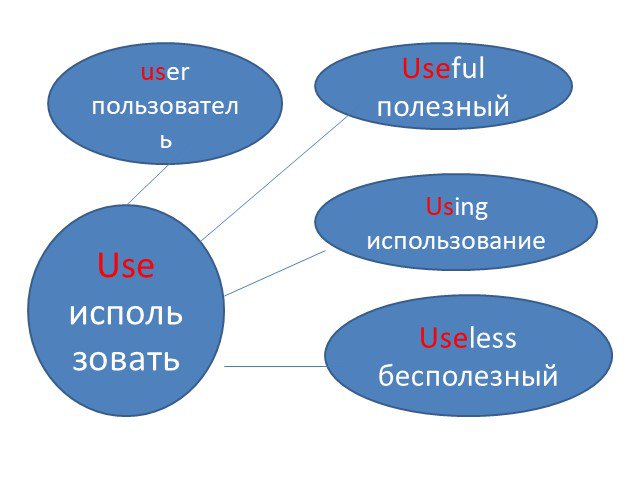
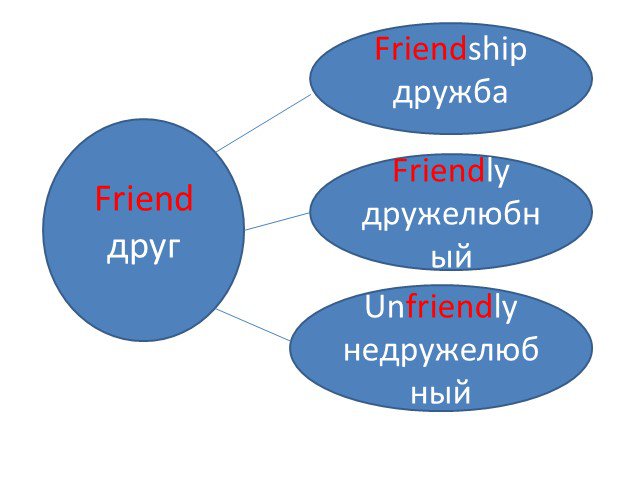
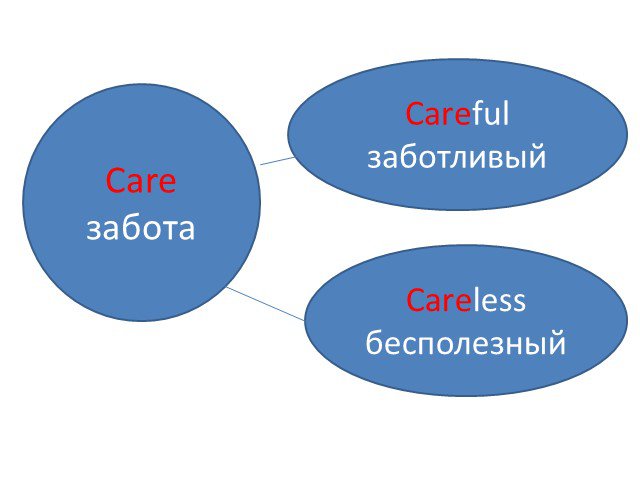
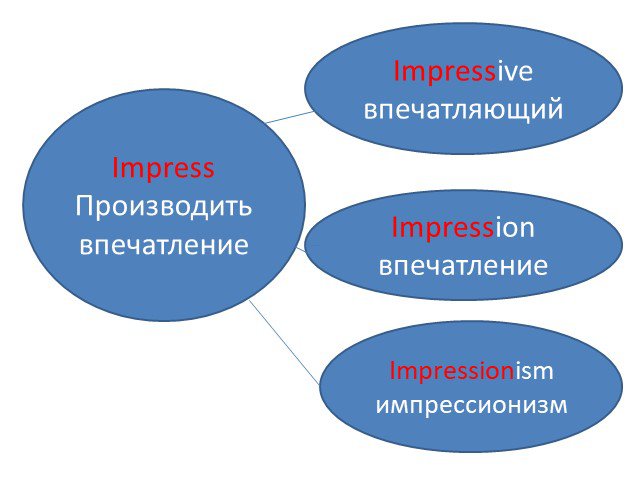
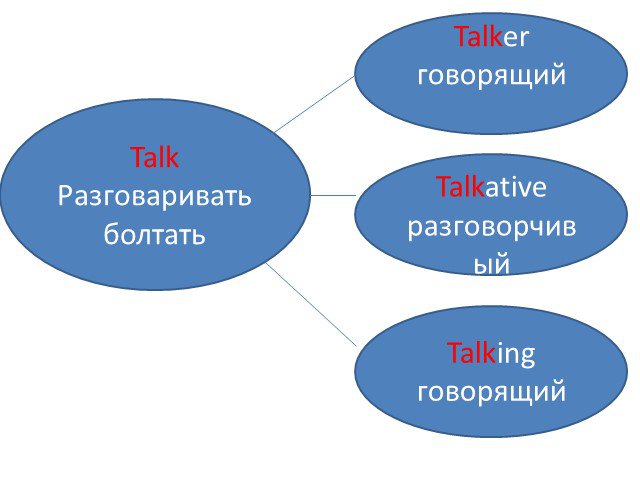
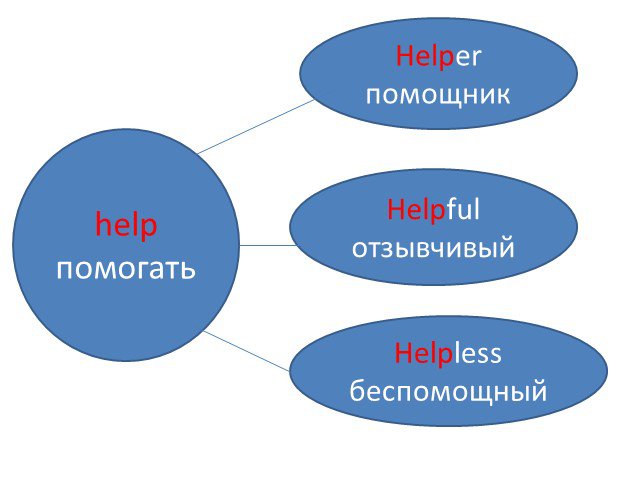
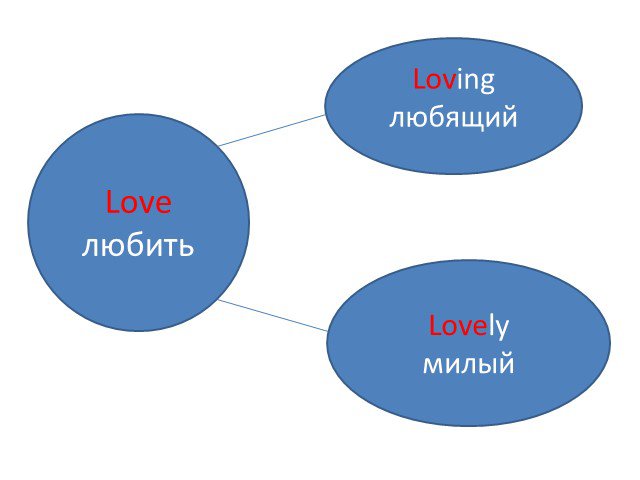
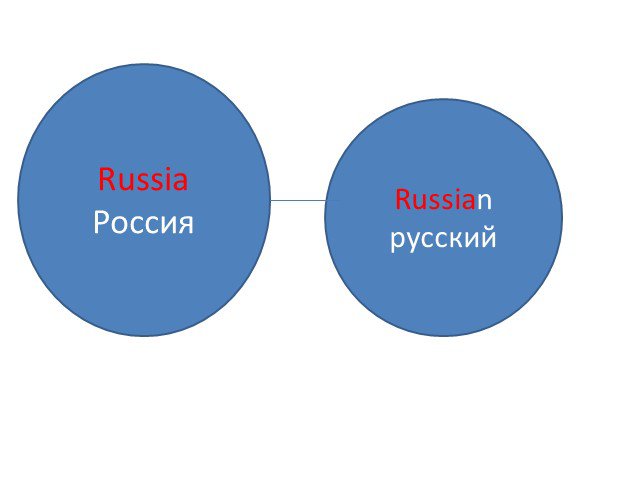
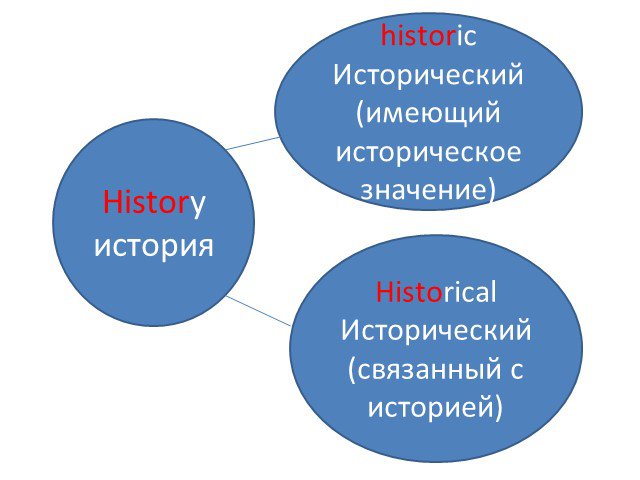
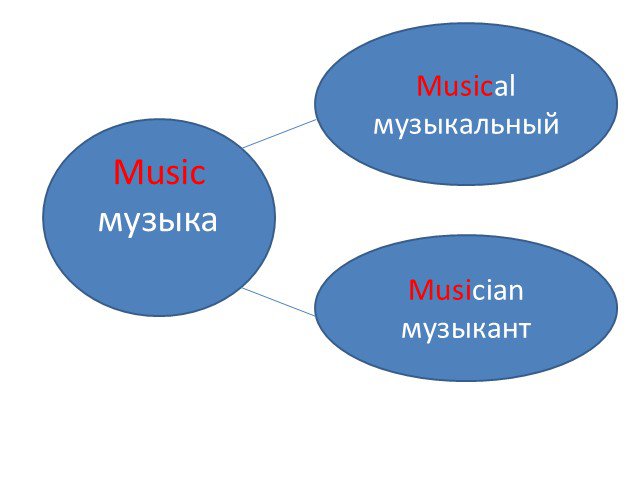
Презентацию на тему «Word building»
можно скачать абсолютно бесплатно на нашем сайте. Предмет
проекта: Английский язык. Красочные слайды и иллюстрации помогут вам
заинтересовать своих одноклассников или аудиторию.
Для просмотра содержимого воспользуйтесь плеером, или если вы хотите скачать доклад — нажмите на
соответствующий текст под плеером. Презентация
содержит 14 слайд(ов).
Слайды презентации
Слайд 1
enjoy enjoyment enjoyable
Получать удовольствие
удовольствие
Доставляющий удовольствие
Слайд 2
Create Творить создавать
creative творческий
creation Творение создание (процесс)
Creativity креативность
Creator Создатель творец
Creature Создание
Слайд 3
Beauty красота Beautiful прекрасный
Слайд 4
Science наука Scientist учёный Scientific научный
Слайд 5
Use использовать Useful полезный Using использование Useless бесполезный user пользователь
Слайд 6
Friend друг Friendship дружба Friendly дружелюбный
Unfriendly недружелюбный
Слайд 7
Care забота Careful заботливый Careless бесполезный
Слайд 8
Impress Производить впечатление
Impressive впечатляющий
Impression впечатление
Impressionism импрессионизм
Слайд 9
Talk Разговаривать болтать
Talker говорящий
Talkative разговорчивый
Talking говорящий
Слайд 10
help помогать Helper помощник Helpful отзывчивый Helpless беспомощный
Слайд 11
Love любить Loving любящий Lovely милый
Слайд 12
Russia Россия Russian русский
Слайд 13
History история
historic Исторический (имеющий историческое значение)
Historical Исторический (связанный с историей)
Слайд 14
Music музыка Musical музыкальный Musician музыкант
Список похожих презентаций
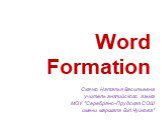
Word formation (словообразование)
depend (on/upon) v зависеть (от). dependent a зависимый, зависящий (от). dependence n зависимость, доверие. independent a независимый, не зависящий …
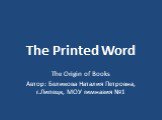
The printed word
The Earliest Books Tablets of wood Clay tablets. Ancient World Papyrus Parchment. The First Public Library Library in Greece Celsius Library. The …
Советы как сделать хороший доклад презентации или проекта
- Постарайтесь вовлечь аудиторию в рассказ, настройте взаимодействие с аудиторией с помощью наводящих
вопросов, игровой части, не бойтесь пошутить и искренне улыбнуться (где это уместно). - Старайтесь объяснять слайд своими словами, добавлять дополнительные интересные факты, не нужно
просто читать информацию со слайдов, ее аудитория может прочитать и сама. - Не нужно перегружать слайды Вашего проекта текстовыми блоками, больше иллюстраций и минимум текста
позволят лучше донести информацию и привлечь внимание. На слайде должна быть только ключевая
информация, остальное лучше рассказать слушателям устно. - Текст должен быть хорошо читаемым, иначе аудитория не сможет увидеть подаваемую информацию, будет
сильно отвлекаться от рассказа, пытаясь хоть что-то разобрать, или вовсе утратит весь интерес. Для
этого нужно правильно подобрать шрифт, учитывая, где и как будет происходить трансляция презентации,
а также правильно подобрать сочетание фона и текста. - Важно провести репетицию Вашего доклада, продумать, как Вы поздороваетесь с аудиторией, что скажете
первым, как закончите презентацию. Все приходит с опытом. - Правильно подберите наряд, т.к. одежда докладчика также играет большую роль в восприятии его
выступления. - Старайтесь говорить уверенно, плавно и связно.
- Старайтесь получить удовольствие от выступления, тогда Вы сможете быть более непринужденным и будете
меньше волноваться.





















































